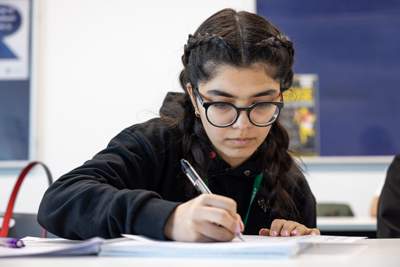 Exam season is officially here, and with it comes lots of different emotions, including stress. This is a very normal response, but it can also have a negative impact on your health. This is why we've come up with some tips and advice for dealing with exam stress.
Exam season is officially here, and with it comes lots of different emotions, including stress. This is a very normal response, but it can also have a negative impact on your health. This is why we've come up with some tips and advice for dealing with exam stress.
Watch out for the signs that you’re experiencing stress. They can include:
- Struggling to sleep
- Having negative thoughts about the future
- Getting headaches or feeling unwell a lot
- Not eating because of how you’re feeling
- Always thinking about your exams or worrying about them
- Not able to enjoy things anymore.
Once you have identified that you may be stressed, you could try the following:
Talk to someone – whether you speak to a parent, a friend, a teacher or someone in our Student Services team, sharing how you’re feeling can help you to feel better. It can help reduce the pressure and make you feel more in control. The other person also may be able to offer you some help, even if it’s taking some time out to do something you enjoy.
Try to relax and take regular breaks – this is so important, even if you feel like you don’t have the time, make time! Taking time away from revision will help you to reset your mind. You’ll find it easier to cope and will find it easier to concentrate when you start work again. Things you could do to help you relax include:
- Setting a timer to take a 20-minute break every hour
- Plan a treat or activity to give yourself something to look forward to
- Plan when you are going to start and finish your revision, so you know when to stop.
Stay healthy – it's easy to start getting into bad habits when we’re feeling stressed, like eating lots of sugar for a quick pick-me-up. But, in the long run, these habits do the opposite of helping.
- Try and eat a healthy diet and don’t skip meals, you need your energy
- Exercise can really help to clear your mind and make you feel energised, whether you go to the gym, yoga, or go for a walk, it all helps!
- Find things that make you feel relaxed and calm.
Get enough sleep! Sleep is so important, but it can be difficult to get the sleep we need when our minds are too busy.
- Decide when you’re going to stop working and don’t push yourself to stay up later
- Avoid caffeine, especially in the evening
- Give yourself time to relax after you stop working
- Eat early in the evening
- Don’t stay up in bed with your phone.
Lastly, be organised. Know when and where your exams are. RuTC students will be emailed details of their exams, so make sure you check your student email. Speak to your teacher asap if you are not sure of anything.
Student Services are here for support if you need them in room G32 (in the Atrium). You can also contact Young Minds, the mental health charity dedicated to young people. Good luck!
